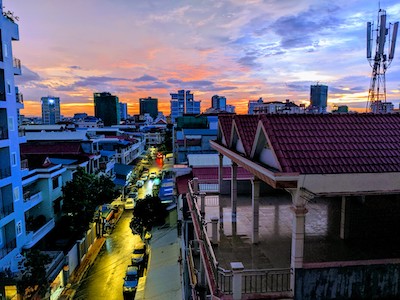August 2

It’s hard to believe, but ten weeks have passed since I arrived in Cambodia and my internship is drawing to a close. My report on sustainable development is complete and very soon I’ll be heading back to the United States. I’ve really enjoyed working with Open Development Cambodia and will miss coming into the office every day.
I’ve learned so much this summer about the Cambodian legal system and how the law is practiced in a developing country, along with what a career in the non-profit world would actually look like. At the beginning of this summer, my intention was to focus on environmental issues, but I ended up spending much of my time learning about land use laws and land conflicts in the country. Over the summer, I came to realize how much the land ownership system and the problem of land theft have shaped Cambodia’s current situation.
I wasn’t expecting to find the history and politics of land use here that interesting, but to my surprise there’s a pretty complicated story behind the current system. It starts with the Khmer Rouge, who completely eliminated private property when they ruled the country from 1975-1979. Land ownership and secure land tenure began to come back in the 80s and 90s but an actual land law wasn’t passed until 2001, which finally legitimized the ownership of many people who had just been squatting on plots of land without any formal documentation of their right to be there. Before that, land theft had been rampant in Cambodia, and people who had their land stolen often had no legal recourse and simply had to move somewhere else and start over.
Since the mid-2000s, local and international activists focused on land issues as one of the key human rights abuses by the government. Because so much of the country relies on agriculture, the government’s inability to protect land rights became a huge issue in several elections. The controversy over land rights is arguably why the Prime Minister’s party lost a number of seats in the 2013 elections, and was set to lose more to opposition parties in 2018.
Right before that election, the government instituted a harsh crackdown on political speech and the main opposition party was dissolved. Because of that, it looks like Cambodia is becoming more authoritarian and backsliding on human rights. Western powers and human rights organizations have stopped funding a lot of initiatives in the country because they believe the system is too corrupt now, while China has been happy to step into that gap and has gained a lot of influence over Cambodia. At the root of all of these issues, however, are fights over who controls the land and what they use it for.
The reason land rights have mattered so much to development is that many people in the country still practice subsistence agriculture, meaning if they lose their land and can’t farm they will have to move to the city for work or starve. Often the government allows development projects to go forward on disputed land, and over the past twenty years there have been a number of cases of illegal evictions, often involving violence. About a third of my final report was on how Cambodia records and enforces land ownership, and the problems many people still face in that system.
The second third of my report dealt with how Cambodia governs investment and different sectors of economic growth. Ever since the economy opened to foreign development, the government has been very pro-investment. It’s been very willing to authorize many large-scale foreign investment projects, even when they pose a real threat to local communities and the local environment. There are some ways for the public to oppose these developments, but they haven't proven to be particularly effective so far. The country has legislatively adopted the practice of performing Environmental and Social Impact Assessments as the avenue for the public to voice opposition to these projects, but it’s not clear how effective that process is.
The last third of my report focused on Cambodia’s environmental law and natural resource management. This area of Cambodian law is fairly underdeveloped. There are some environmental protections and systems set up to fairly manage resources like forests and fisheries, but enforcement is a real problem in Cambodia. Illegal logging is rampant, both because of the damage it causes to sensitive environments and because it’s often used to fund other illicit activities. A new comprehensive environmental law has been in the works for a few years which would likely improve the situation, but it’s unclear when that will ever be enacted. However, there have been a number of grassroots campaigns on stopping pollution and using less plastic that have actually been very successful. Cambodia’s people, it seems, are very invested in protecting their environment, even if the laws aren’t there yet.
The above is a fairly short summary of what I’ve actually been working on all summer. I’m very happy with the work I produced and I’m hopeful that my report will be useful for ODC and their mission of keeping the public informed of how Cambodia is developing. I’m grateful to have simply had the opportunity to come here and broaden my perspective on these issues, and while I'll miss Cambodia, I'm looking forward to getting back to the US. My time here has certainly shaped how I think about the positives and negatives of economic development both here and back in the US, and I'm looking forward to learning more about how these dynamics play out back home.
That's all for this blog, however. Thanks for reading!